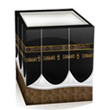The Ruling on Using Quotes from the Qur'aan for Common Speech
- Details
- Category: Sheikh Bin Baz
- Published on Thursday, 07 November 2013 10:32
- Hits: 966
The Ruling on Using Quotes from the Qur'aan for Common Speech
Question:
Is it permissible to speak using the Qur'aan; what I mean by this, for example, to say when you meet somebody, "Peace be upon you, a Word from the Lord (Allaah), Most Merciful," (Surah Ya Sin 36:58)? This is similar to what the women did in the famous story related by 'Abdullah bin Al-Mubarak.
Answer:
What is known among the scholars is that the Qur'aan is not to be used in normal speech. Speech is one matter, and the Qur'aan is another. At the very least such behavior is Makruh (disliked). Rather one should say the traditional greeting, as the Prophet sallAllaahu `alayhi wa sallam did with his Companions, may Allaah be pleased with them: "Peace be upon you and the mercy and blessing of Allaah" and: "And upon you also be the peace, mercy and blessing of Allaah." This is the customary greeting that should be used in daily speech.
Shaykh `Abdul-`Azeez Bin Baz
Fatawa Islamiyah, vol.7, p.63, DARUSSALAM





















